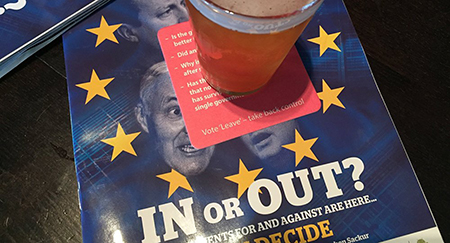 Tim Martin’s had enough. The chairman of a popular pub and hotel chain in the UK made a public statement about his feelings around social media, as the company shut down its social media accounts on Monday. Their pub’s publication (that’s not easy to say), The Wetherspoon News, is a magazine read by 2 million customers each quarter… in print!
Tim Martin’s had enough. The chairman of a popular pub and hotel chain in the UK made a public statement about his feelings around social media, as the company shut down its social media accounts on Monday. Their pub’s publication (that’s not easy to say), The Wetherspoon News, is a magazine read by 2 million customers each quarter… in print!
“Rejecting the widely held idea that a successful business needs a social media presence, J.D. Wetherspoon on Monday pulled the plug on hundreds of Twitter, Instagram, and Facebook accounts linked to its 900 pubs across the country,” writes Trevor Mogg in Digital Trends. “It also closed accounts associated with its head office.”
Martin cited several reasons for the decision, including the misuse of user data and all the recent bad publicity around social media. He also expressed real concern about the effects of digital addiction, and in particular pointed out “the trolling of MPs and others, especially those from religious or ethnic minorities.”
In other words, he’s as fed up with social media like so many of us are … and he’s not afraid to do something about it.
“People who don’t use it feel that the people who do use it are too preoccupied by it, they’re on it too much, and people who do use it wish they could get off it,” he said in an interview with LBC Radio.
“Notably, the 62-year-old chairman said he had concerns that social media was causing some of his pub managers to be ‘side-tracked from the real job of serving customers,’ adding that after consulting them, ‘90 to 95 percent’ agreed the medium provided little value to the business,” Mogg writes.
They certainly weren’t a social powerhouse, as Mogg explains, with just 50K followers on Twitter and just over six thousand on Instagram.
“But some will suggest its content wasn’t interesting enough to attract followers, and that a more creative approach to the medium could’ve scored more interest, allowing it to publicize offers and events to attract more people to its pubs,” Mogg continues.
Be that as it may, the company will be taking back ownership of its marketing channels, especially in its print magazine, on its website, and through its relationship with the press.
Will they ever realize the error of their ways and come back to Facebook? Martin certainly hopes not.
“It’d be completely fascinating if I have to crawl back to Facebook, my goodness me, that’d be a catastrophe,” he said in an interview with the BBC, “It’s not impossible — you have to keep your options open in business. If I do it, what a humiliation.”
The brand is not shy about taking a stand on social issues; their website includes a modern slavery statement that affirms their commitment to help combat slavery and human trafficking throughout their organization and entire supply chain.
With this kind of social awareness hard-baked into their company’s DNA, their decision to quit social media seems like the logical step. While Facebook continues to wriggle its way out of owning the downside of social media, more people and brands are waking up to the potential downside and walking away.
Can a business survive without the exposure of social media? Given the massive press coverage Martin’s decision is getting, I’d bet a pint that J.D. Wetherspoon will make a good go of it.
